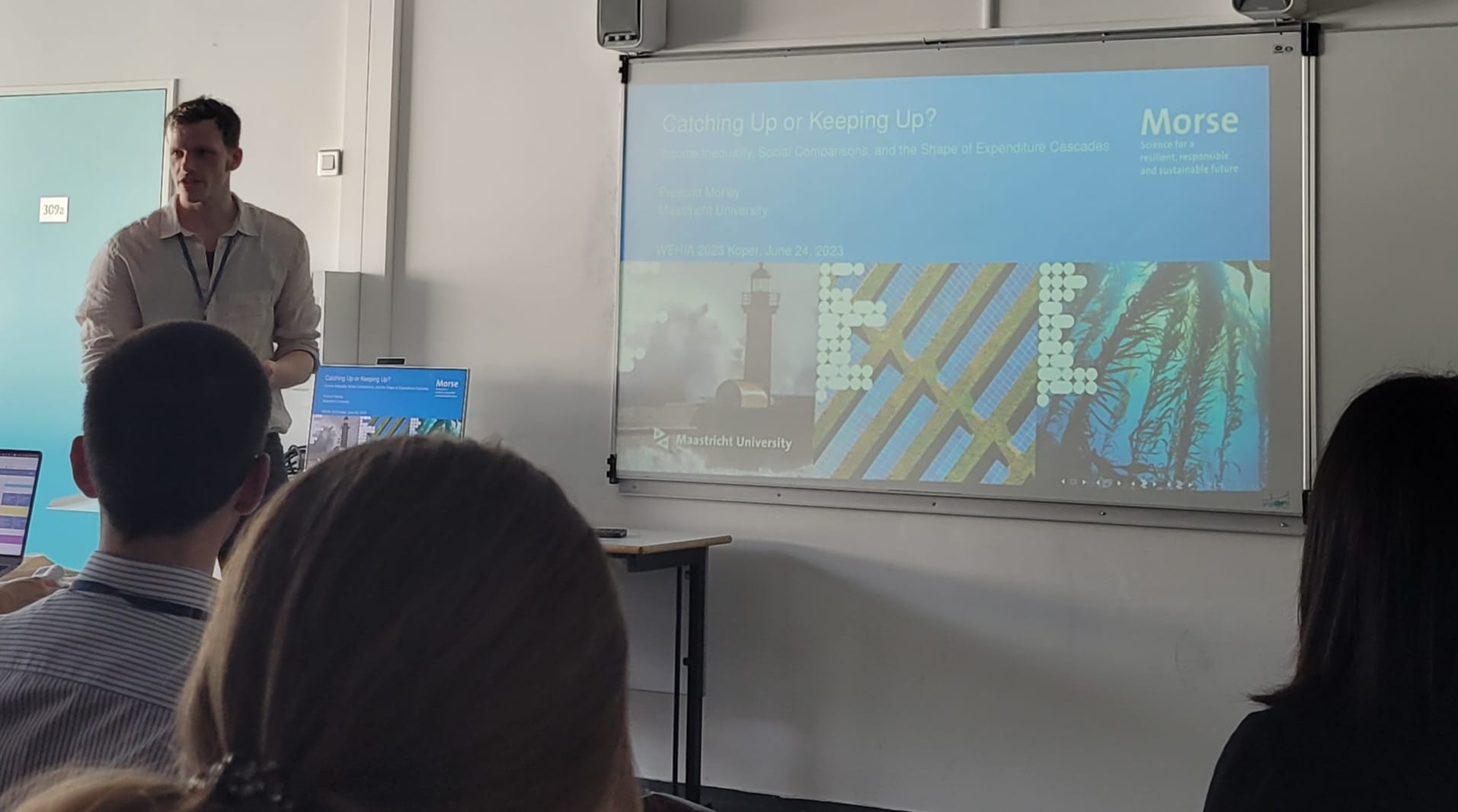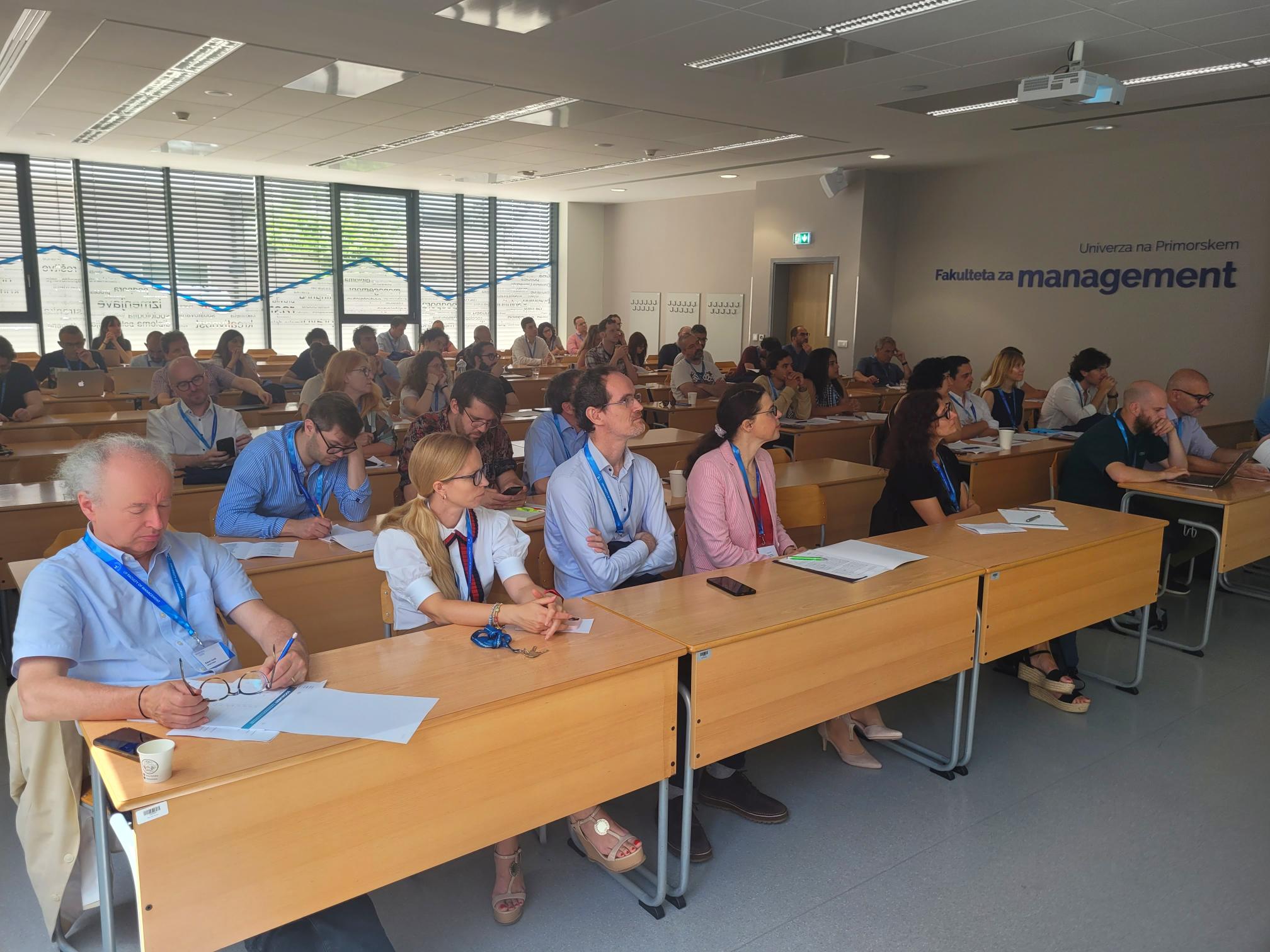Complex Systems and Sustainability: Exploring the Possibilities
My work focuses on applying the computational methodology of Agent-Based Modeling to questions about the sustainability of trends in aggregate consumption. My first paper “Catching Up or Keeping Up?” addresses the interaction of peer effects and developments in aggregate demand when income inequality varies. This investigation functions as a sort of stepping-stone on the path towards answering further questions about greener consumption behavior.

This is an exciting area of research, as the intersection of complex systems modeling, behavioral economics, and ecological sustainability. It carries potential to bring important modeling insights to public policy discussions concerning sustainability, as well as to contribute to the ability of macroeconomists to realistically model sustainability. However, my focus on theoretical computational modeling means that the technical details of my research tend to be somewhat removed from that of most of my peers in MORSE.
This summer, I had the opportunity to present my work at two methodology-focused conferences. First, I attended the 2023 annual Workshop on Economic science with Heterogeneous Interacting Agents (WEHIA) at the University of Primorska in Koper, Slovenia, and then the 29th Conference on Computing in Economics and Finance (CEF) held at l’Université Côte d’Azur in Nice, France. It was of course exciting to present and discuss my work in a context where the technical details were in the spotlight. It was also wonderful to get the chance to meet with some of the biggest names in Agent-Based Modeling in economics and macroeconomics, including Herbert Dawid, Domenico Delli Gatti, and Giovanni Dosi.
However, it was especially interesting to meet and discuss with so many other researchers who are applying complex systems modeling to all sorts of questions about sustainability and resilience. Presentations covered fascinating topics such as macroeconomic risks along a green transition path, country willingness to enact green transition policies, the effectiveness of different policy strategies in motivating a green transition, inequality and consumer adoption of green innovations, the effectiveness of certain policies in stabilizing financial markets, and even interactions between natural resource stocks and conflict dynamics in resource-rich regions.
By summarizing a few conclusions from some papers that concern the green transition in particular, we can observe a strong example of the contributions offered by this body of research. For example, modelers find that differences between countries in how they experience both climate change and transitions greatly reduce the likelihood that countries will engage in sustained climate cooperation in the long-term, which suggests the importance of a fair and equitable system of international cost sharing in order to achieve a global transition. Even if that transition occurs, however, other modelers find that it will likely generate significant economic slowdowns, causing recessions and increased unemployment, which can of course exacerbate intranational inequality. In light of this, the paper on inequality and consumer adoption of green innovations becomes particularly interesting. The author showed that the fiscal constraints which prevent low-income consumers from buying into green innovations are not likely to be overcome by standard policies that are used to motivate the consumer transition, and that this limitation gets worse with more inequality in society. The suggestion is that more targeted financial support is necessary to bring the green transition to all segments of population, particularly as inequality increases.
So, we can see that the application of complex systems modeling techniques can offer insights on the constraints and points of interest regarding the various levels and stages of sustainable transitions. These insights can help us not only to know what to expect at each juncture, but also to have some idea of how to address and prepare for the challenges that we will face along the way.
Seeing all of these researchers gathered together and hearing what they had to contribute was inspiring, providing me with much to consider about how such important questions can be approached. As a PhD candidate, it was also greatly reaffirming, showing me first-hand that the academic world is full of people who are approaching those questions in ways that are familiar to me and my own research. And of course, I also took the opportunity to spread some awareness about MORSE and upcoming events to those who may be interested. There is a whole exciting world to explore for all kinds of academic insights on sustainability and resilience. I am pleased that I get to play a small role in the exchange.

Keeping Up or Catching Up? Income Inequality, Social Comparisons, and the Shape of Expenditure Cascades
Abstract
The shape of expenditure cascades has important implications for macro- and ecological economics, as it helps us to understand the transmission process from policies affecting inequality to changes in total consumption volumes. The expenditure cascades hypothesis, that income gains at the top of the income distribution lead to greater expenditures throughout the distribution, is typically built on upward-looking social comparisons, the idea that individuals only compare themselves to those with higher income (consumption) than themselves. However, this assumption is unnecessary and insufficiently justified in the literature. In this paper I propose an agent-based model of consumption decisions, which employs a novel method of integrating the consumption reference into the utility function. Using this model, I demonstrate that expenditure cascades can occur in the microeconomic sense without the upward-looking assumption, but that dropping the assumption can reverse the direction of the effect of inequality on the aggregate savings rate. The model offers a new theoretical perspective on the ambiguous empirical evidence in this area.
Also read
-
Flour, family, and forward thinking: the evolution of Hinkel Bäckerei
In the heart of Düsseldorf, the comforting aroma of freshly baked bread has drifted through the streets for more than 130 years. Since its founding in 1891, Hinkel Bäckerei has evolved from a small neighborhood bakery into a cherished local institution.
-
Contribute to a Voice for Children in Conflict Areas
Dr Marieke Hopman and Guleid Jama are launching a new research project on the role of children in peacebuilding in conflict areas.
-
Administrative integration through agency governance The role of Frontex, the EUAA and Europol
PhD thesis by Aida Halilovic